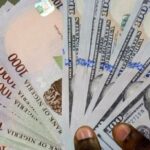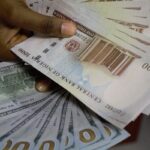The pressure on the foreign exchange (FX) market marginally eased on Tuesday as naira steadied against the United States dollar in the parallel market.
According to Aboki FX, the naira sold for N1,160 on Monday and Tuesday respectively. Checks by our correspondent at one of the Bureau De Change (BDC) hubs in Lagos indicated that the currency stabilised in the last 48 hours.
Another BDC operator, Alhaji Hassan Sabo, told our correspondent that he buys one dollar at N1,150, about the same price it opened on the first market day of the week.
“It is still better compared to the 1,300 we exchanged for one dollar about a few weeks ago,” he said.
WACSOF warns public about fake news, fraudulent people parading as excos
Newspaper distributors laud Media Trust chair’s re-election as NPAN president
Also, the volume of United States dollars turnover in the Nigerian Foreign Exchange Market (NAFEM) window rose to $100.06million, on Monday.
The daily forex turnover rose by 32 per cent from $75.82million, on Friday, November, 24, 2023 to $100.06million on Monday, November, 27, 2023.
According to the data from NAFEM, the country’s official foreign exchange market, the rise in the daily forex turnover reflected increased FX inflow in the economy on Monday, 27th November, 2023.
Also, data from FMDQ Securities Exchange showed that the local currency, on Monday, hit an intra-day trading high of N1,130 and a low of N700.
It would be recalled that the Governor of Central Bank of Nigeria (CBN), Olayemi Cardoso, said the apex regulatory bank will introduce a set of new rules and guidelines to achieve exchange rate stability.
He said, “In order to ensure the proper functioning of domestic and foreign currency markets, clear, transparent and harmonised rules governing market operations are essential. New foreign exchange guidelines and legislation will be developed and extensive consultations will be conducted with banks and FX market operators before implementing any new requirements.”
According to Cardoso, stabilising the FX market is critical to economic stability in the nation.
Speaking in Lagos last weekend, he said, “Stabilising the exchange rate is another critical aspect of our efforts to promote economic stability. I had the privilege of speaking with business owners engaged in international trade.
“They recounted the difficulties of navigating the fluctuations in the exchange rate, which often led to uncertainties and unexpected costs. The volatility in the foreign exchange market disrupted their planning and hindered their ability to make informed business decisions…”

 Join Daily Trust WhatsApp Community For Quick Access To News and Happenings Around You.
Join Daily Trust WhatsApp Community For Quick Access To News and Happenings Around You.
